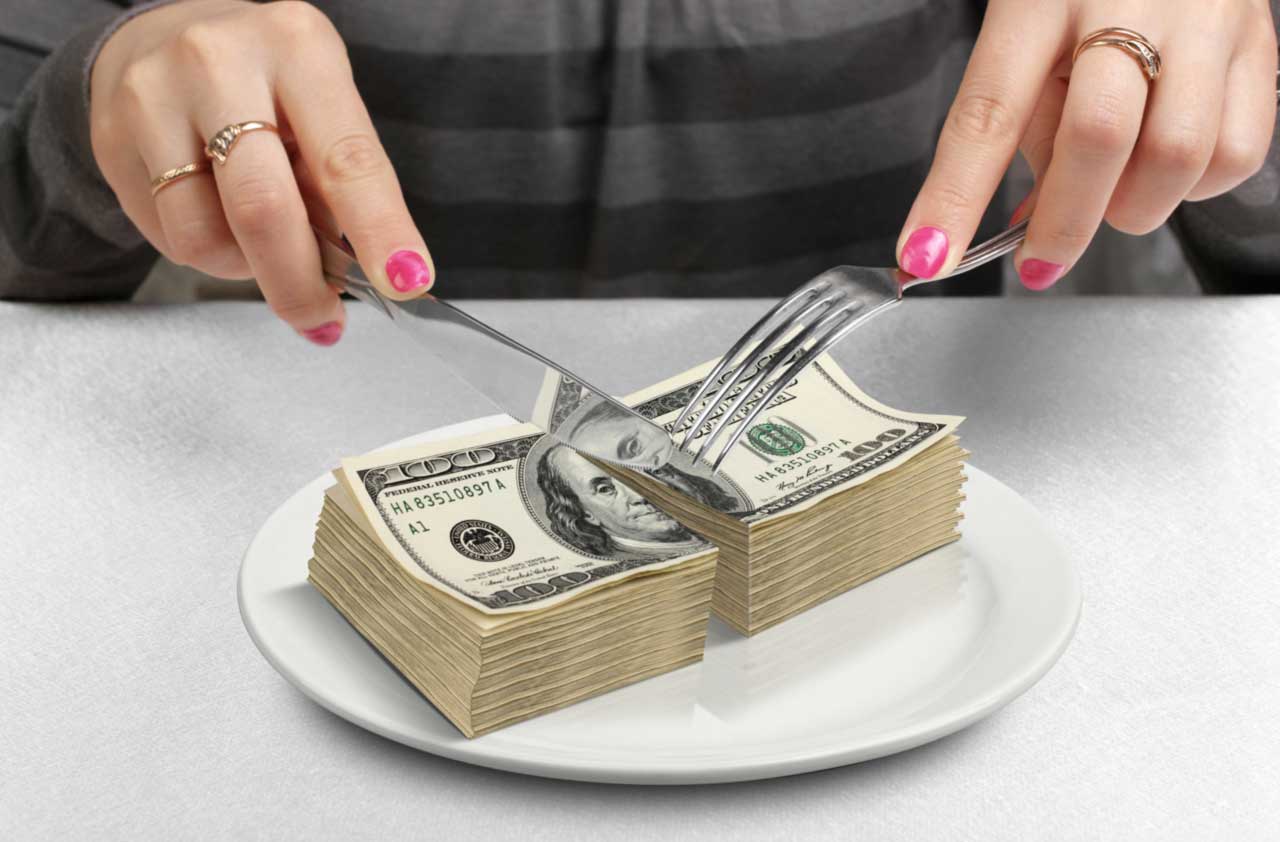Put Yourself on a Financial Diet Now for a Happier Retirement Later
Developing some healthy financial habits now can help set you up for a secure retirement. And it may even let you retire sooner than you thought possible.


Profit and prosper with the best of Kiplinger's advice on investing, taxes, retirement, personal finance and much more. Delivered daily. Enter your email in the box and click Sign Me Up.
You are now subscribed
Your newsletter sign-up was successful
Want to add more newsletters?

Delivered daily
Kiplinger Today
Profit and prosper with the best of Kiplinger's advice on investing, taxes, retirement, personal finance and much more delivered daily. Smart money moves start here.

Sent five days a week
Kiplinger A Step Ahead
Get practical help to make better financial decisions in your everyday life, from spending to savings on top deals.

Delivered daily
Kiplinger Closing Bell
Get today's biggest financial and investing headlines delivered to your inbox every day the U.S. stock market is open.

Sent twice a week
Kiplinger Adviser Intel
Financial pros across the country share best practices and fresh tactics to preserve and grow your wealth.

Delivered weekly
Kiplinger Tax Tips
Trim your federal and state tax bills with practical tax-planning and tax-cutting strategies.

Sent twice a week
Kiplinger Retirement Tips
Your twice-a-week guide to planning and enjoying a financially secure and richly rewarding retirement

Sent bimonthly.
Kiplinger Adviser Angle
Insights for advisers, wealth managers and other financial professionals.

Sent twice a week
Kiplinger Investing Weekly
Your twice-a-week roundup of promising stocks, funds, companies and industries you should consider, ones you should avoid, and why.

Sent weekly for six weeks
Kiplinger Invest for Retirement
Your step-by-step six-part series on how to invest for retirement, from devising a successful strategy to exactly which investments to choose.
If you’re like many retirees and soon-to-be retirees in the U.S., your top worry right now is that your nest egg won’t last as long as you do.
But what are you doing about it? And how is your financial professional helping you address your concerns?
Like most financial advisers, my wife and I spend a lot of time talking to prospective clients about income. We use our first get-to-know-you meeting mostly to ask questions and gather information about assets and possible income streams. In our second meeting, we review those numbers and explain the tools we can use to help make the most of their money. And in our third meeting, if they decide to go with us, we get down to the details — and get to work.
From just $107.88 $24.99 for Kiplinger Personal Finance
Become a smarter, better informed investor. Subscribe from just $107.88 $24.99, plus get up to 4 Special Issues

Sign up for Kiplinger’s Free Newsletters
Profit and prosper with the best of expert advice on investing, taxes, retirement, personal finance and more - straight to your e-mail.
Profit and prosper with the best of expert advice - straight to your e-mail.
But we realized, fairly recently, that we weren’t talking about the money going out nearly as much as the money coming in. And for many people, that can be a huge factor in the success or failure of their retirement plan. They’ve built up a lifestyle of consumption, and when they retire, they usually don’t plan to change things much. Indeed, many expect to travel more, renovate the kitchen, move to a warmer climate or take up a new hobby. And those things cost money.
In the past, research by Aon Consulting and Georgia State University suggested you’d need to replace 70% to 90% of your annual pre-retirement income with the money you’re bringing in from various sources in retirement. Based on 20 years of giving advice, I’d say 90% is the right figure for most people these days — at least until they reach their 70s and slow down a bit.
But there’s a way around that daunting post-paycheck reality: Spend less. Look at the other side of the spreadsheet and knock off or down a few of those numbers.
When we give people an expense sheet to fill out, those who actually do it are amazed at where their money is going. People go to Starbucks once or twice during their workday. Many go out to lunch every day — and stop for takeout on the way home.
We develop these habits when we’re working and cash flow is consistent. But that doesn’t mean we have to spend the money — or that we should.
Forget about running out of money in retirement — there are people who actually could retire earlier than planned if they simply would put themselves on a financial diet. So, let’s weigh a few options:
- Dump your debt. Most financial planners and money managers will tell you that if you can find an investment with a return that’s larger than what you’re paying in interest on your debt, you should do it. But it’s hard to find a situation like that right now — unless that debt is your mortgage, which also offers tax savings. Just about anything else — especially credit card debt — is going to be financed at a high rate. And the money you take out of your income to service that debt could hinder you from achieving your financial goals.
- Ditch your kids’ debts, too. We often find that parents are still paying student loans for children who are long out of the house and sometimes doing better financially than they are. Frequently, the kids don’t even realize their parents are still shouldering that burden and would be fine with taking over the responsibility for the payments themselves.
- Don’t be lazy. Make a list before you go to the grocery store. Cook more instead of eating out. Make your own coffee instead of spending $1.50 or more for a cup at McDonald’s, Dunkin’ Donuts or Starbucks. Get a library card and borrow books instead of buying them online.
- Cut down on business expenses. If you own your own business, you have some control over the costs. It’s amazing what you can save by shopping around for a better price on office supplies, furniture, cleaning services or auto insurance.
- Trade today’s luxuries for tomorrow’s contentment. Do you really have to lease a new car every three years, and does it have to be a luxury brand? Or could you go out and buy a used car with 30,000 miles on it and run it for the next decade?
The bottom line is you can make some cuts now, on your own terms, or make them later because you have to.
I can tell you this from experience, though: The folks who are really happy in retirement are the ones who have figured out what it costs to live comfortably, and they know they have those expenses covered.
Investment advisory services offered only by duly registered individuals through AE Wealth Management LLC (AEWM). AEWM and Your Own Retirement are not affiliated companies. Investing involves risk, including the potential loss of principal. Any references to protection benefits, safety, or guaranteed income generally refer to fixed insurance products, never securities or investment products. Insurance and annuity product guarantees are backed by the financial strength and claims-paying ability of the issuing insurance company.
Profit and prosper with the best of Kiplinger's advice on investing, taxes, retirement, personal finance and much more. Delivered daily. Enter your email in the box and click Sign Me Up.

David Hickey is a managing director at Your Own Retirement in Cranberry Township, Pennsylvania. He has over 30 years of experience in the insurance, finance and investment industry. Hickey has earned the Certified Property and Casualty Underwriting designation from the American Institute. He has a Bachelor of Arts degree in English from the University of Pittsburgh. Hickey has contributed his time to coaching baseball and ice hockey; part and parcel of raising five children with his wife of 31 years, Susan.
-
 5 Vince Lombardi Quotes Retirees Should Live By
5 Vince Lombardi Quotes Retirees Should Live ByThe iconic football coach's philosophy can help retirees win at the game of life.
-
 The $200,000 Olympic 'Pension' is a Retirement Game-Changer for Team USA
The $200,000 Olympic 'Pension' is a Retirement Game-Changer for Team USAThe donation by financier Ross Stevens is meant to be a "retirement program" for Team USA Olympic and Paralympic athletes.
-
 10 Cheapest Places to Live in Colorado
10 Cheapest Places to Live in ColoradoProperty Tax Looking for a cozy cabin near the slopes? These Colorado counties combine reasonable house prices with the state's lowest property tax bills.
-
 Don't Bury Your Kids in Taxes: How to Position Your Investments to Help Create More Wealth for Them
Don't Bury Your Kids in Taxes: How to Position Your Investments to Help Create More Wealth for ThemTo minimize your heirs' tax burden, focus on aligning your investment account types and assets with your estate plan, and pay attention to the impact of RMDs.
-
 Are You 'Too Old' to Benefit From an Annuity?
Are You 'Too Old' to Benefit From an Annuity?Probably not, even if you're in your 70s or 80s, but it depends on your circumstances and the kind of annuity you're considering.
-
 In Your 50s and Seeing Retirement in the Distance? What You Do Now Can Make a Significant Impact
In Your 50s and Seeing Retirement in the Distance? What You Do Now Can Make a Significant ImpactThis is the perfect time to assess whether your retirement planning is on track and determine what steps you need to take if it's not.
-
 Your Retirement Isn't Set in Stone, But It Can Be a Work of Art
Your Retirement Isn't Set in Stone, But It Can Be a Work of ArtSetting and forgetting your retirement plan will make it hard to cope with life's challenges. Instead, consider redrawing and refining your plan as you go.
-
 The Bear Market Protocol: 3 Strategies to Consider in a Down Market
The Bear Market Protocol: 3 Strategies to Consider in a Down MarketThe Bear Market Protocol: 3 Strategies for a Down Market From buying the dip to strategic Roth conversions, there are several ways to use a bear market to your advantage — once you get over the fear factor.
-
 For the 2% Club, the Guardrails Approach and the 4% Rule Do Not Work: Here's What Works Instead
For the 2% Club, the Guardrails Approach and the 4% Rule Do Not Work: Here's What Works InsteadFor retirees with a pension, traditional withdrawal rules could be too restrictive. You need a tailored income plan that is much more flexible and realistic.
-
 Retiring Next Year? Now Is the Time to Start Designing What Your Retirement Will Look Like
Retiring Next Year? Now Is the Time to Start Designing What Your Retirement Will Look LikeThis is when you should be shifting your focus from growing your portfolio to designing an income and tax strategy that aligns your resources with your purpose.
-
 I'm a Financial Planner: This Layered Approach for Your Retirement Money Can Help Lower Your Stress
I'm a Financial Planner: This Layered Approach for Your Retirement Money Can Help Lower Your StressTo be confident about retirement, consider building a safety net by dividing assets into distinct layers and establishing a regular review process. Here's how.